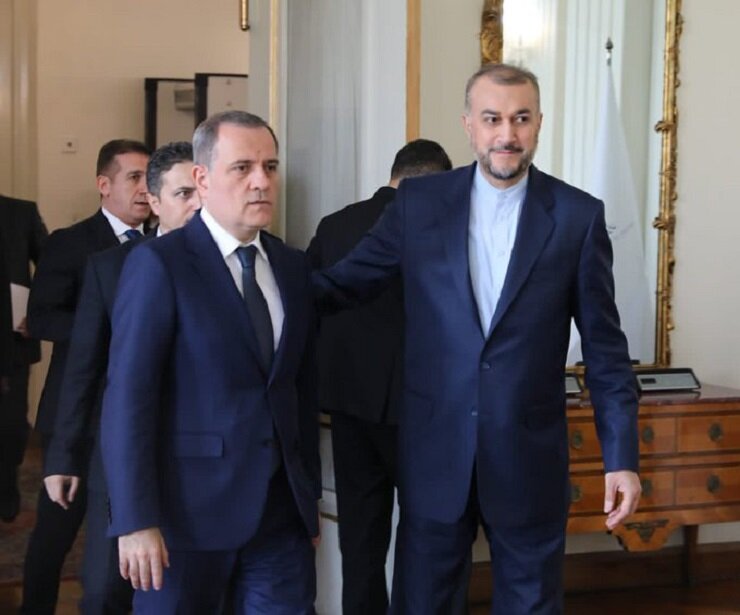Neighborhood policy positively affects Tehran-Baku ties

TEHRAN – In the wake of the visit of Azerbaijan’s chief diplomat to Iran, relations between Tehran and Baku appear to be getting back on the right track in line with a new Iranian foreign policy agenda that prioritizes relations with neighboring countries.
On Monday, Azerbaijani Foreign Minister Jeyhun Bayramov arrived in Tehran for talks over how to deepen ties with Iran. Bayramov met with his Iranian counterpart, Hossein Amir Abdollahian, and President Ayatollah Seyed Ebrahim Raisi.
After the visit, the Iranian foreign minister praised the bilateral talks, saying that Tehran-Baku relations are back on the right track. “My brother Jeyhun Bayramov and I had an important and friendly conversation. We discussed bilateral, regional, and international issues and underlined the need for peaceful settlement of Karabakh based on protecting the territorial integrity and respecting the sovereignty. The ties are on the right track. The visit of Azeri President Ilham Aliyev was put on the joint agenda,” Amir Abdollahian said on Twitter.
The visits come against a backdrop of diplomatic efforts to rein in misunderstandings that overshadowed relations between Tehran and Baku in recent months. After the 2020 Karabakh war, these relations faced some challenges arising from border and trade issues. At some point, Azerbaijan detained some Iranian truck drivers in the newly-liberated Karabakh region in the wake of the 2020 war. Coupled with some controversial remarks by an Azerbaijani lawmaker and Azerbaijani media, the detention of truck drivers escalated tensions between Tehran and Baku. Iran was quick to resort to diplomacy to clear up misunderstandings while also showing its military muscle by holding the biggest military drill in years in its northwest provinces on the border with the Republic of Azerbaijan.
With the visit of Bayramov, Iran and Azerbaijan have moved past those tensions and are now in the process of cementing ties in line with the Raisi administration’s neighborhood policy. During his meeting with Bayramov, President Raisi said there is no limit to deepening and strengthening relations with the Republic of Azerbaijan, according to a readout of the meeting put out by the Iranian presidency.
Underlining the need for creating a new momentum in Tehran-Baku relations, Raisi said, “Promoting good bilateral relations can lead to effective regional cooperation.”
Raisi also emphasized closer interactions between the people of the two countries, saying, “Strengthening people-to-people relations and interactions will strengthen the friendship of the two nations.”
Ayatollah Raisi expressed hope that with the visit of the president of Azerbaijan to Tehran, there will be a leap in the relations between the two countries.
The Azerbaijani foreign minister, in turn, appeared to be addressing one of Iran’s key concerns regarding relations with Azerbaijan which is the foreign interference in the region. Iran has long said it opposes foreign interference in the region. It has also warned of Israeli presence in Azerbaijan.
Bayramov stated that his country is on the same page with Iran regarding foreign meddling.
“The Islamic Republic of Iran and the Republic of Azerbaijan agree that regional issues should be resolved by the countries of the region themselves and without the interference of outsiders,” he said.
Iran and Azerbaijan seem to have succeeded in creating a common ground to further develop ties. Both countries have a desire to enhance ties. In his meeting with Amir Abdollahian, Bayramov referred to his country’s determination to expand ties with Iran. He expressed pleasure at the growing trend of bilateral ties and said Baku is resolved to complete and launch joint projects and also to design and launch new joint ventures.
